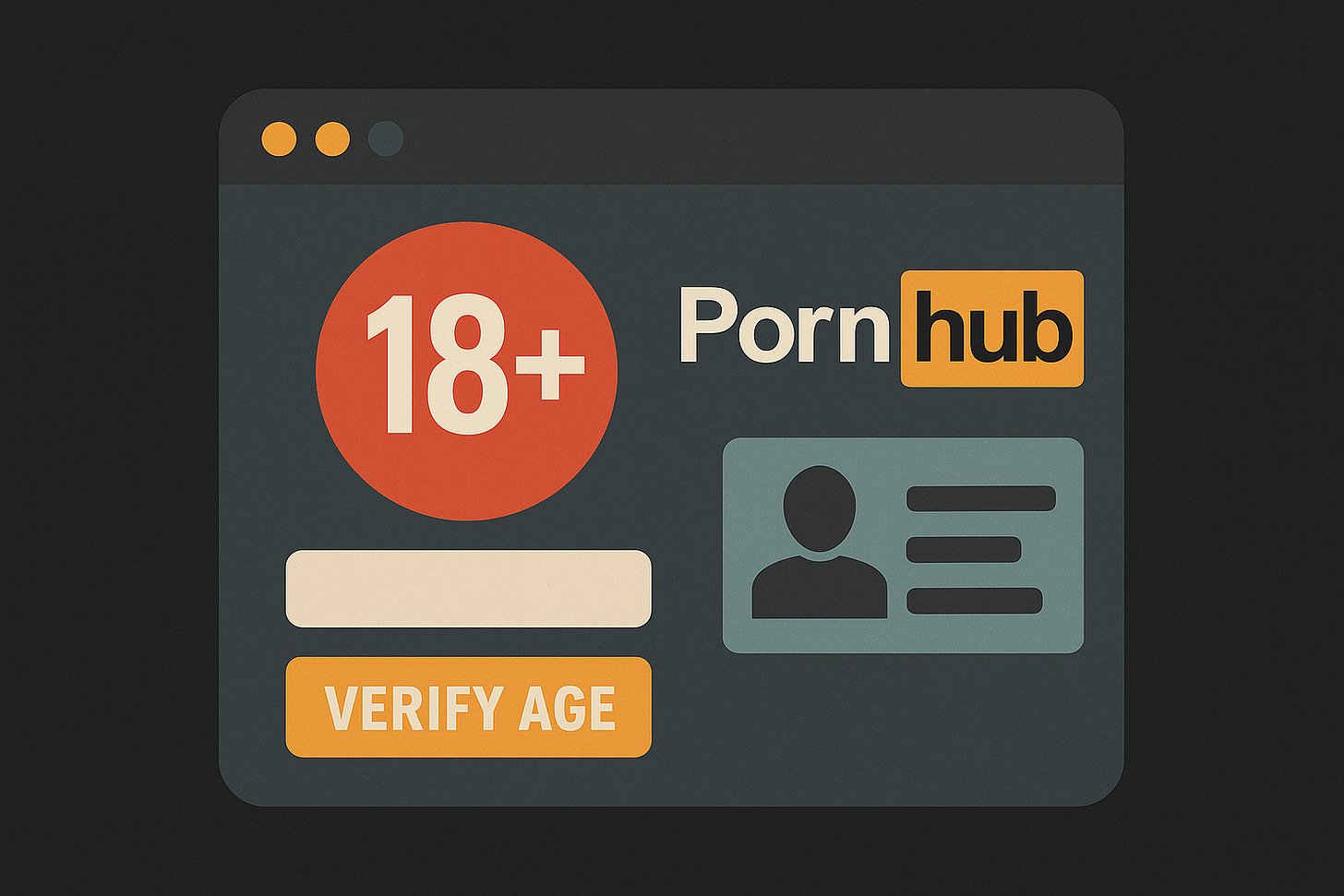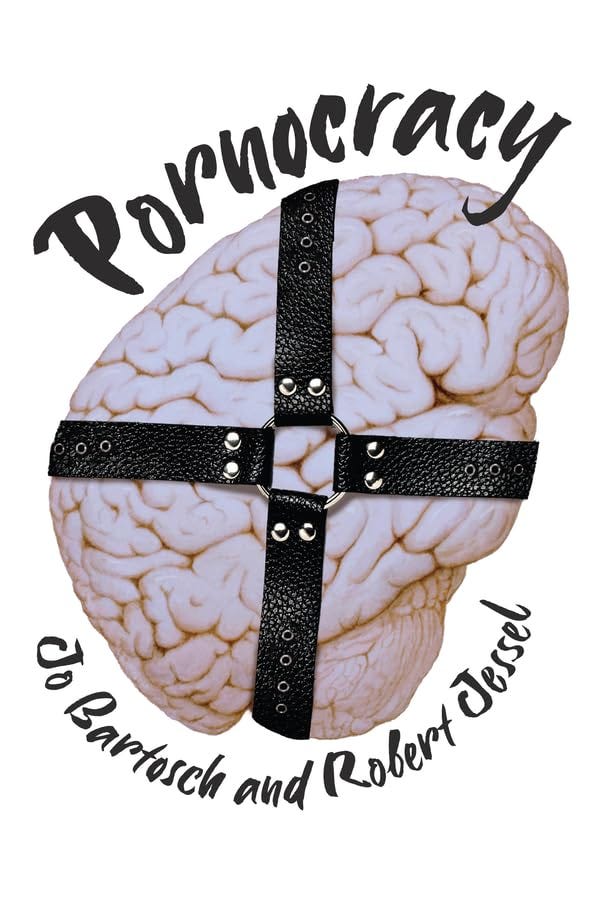The Joy of Text
#1 Jo & Robert discuss age verification in the age of the pornocrats.
Robert and I both agree that pornography threatens the future of our species — though we don’t always see eye to eye on how to tackle it. In the run-up to the launch of Pornocracy, we’ll be publishing regular written dialogues to hash it out.
Robert: The implementation of the Online Safety Act has given sharp focus to our disagreement on how we best combat the pornography epidemic. Why are you so vocal in your support of legislation we both believe to be flawed?
Jo: I’ll admit it, I’ve a contrarian streak, and I’m instantly wary when new “default opinions” take hold — whether it’s “transwomen are women” or “age verification is pointless because of VPNs.” I share the concerns about how some site owners have chosen to implement the new laws. To use X as an example, I strongly suspect that the censorship of protests is a strategic move to galvanise opposition to any attempt to rein in the power of tech giants.
Let’s compare X to how age verification works on other sites. To access Pornhub all you need as an adult is an email address — less data than you hand over without a thought every time you scan a supermarket loyalty card. The British public is being played by billionaire technologists like Musk — men who have no real interest in our freedom, and for whom children’s safety and women’s dignity are mere collateral in the pursuit of profit.
Jo: Why don’t you think it’s a good thing that, thanks to the OSA, children who aren’t looking for porn — and have no intention of seeking out a VPN — will no longer stumble across it on social media?
Robert: My problem isn’t with verification; it’s that this measure is part of a manifestly bad law. The vague definition of ‘harm’ in the OSA leaves whole swathes of interaction and communication vulnerable to censorship and criminalisation. We’ve seen exactly the same thing with the subjective definition of hate speech.
This leaves a worthy object of censorship — increasingly violent and extreme pornography — lumped in with wider attacks against legitimate subjects of freedom of expression. (What’s legitimate speech? Almost anything but pornography.) By tacking pornography onto this bill, it makes it seem like an afterthought, as if politicians do not see the epidemic as a monolithic threat in its own right.
One of the overlooked purposes of law is to lay down a civilisational marker, where we say: ‘These are the things we abhor’. Until society — from schools to parliament to parents — show they understand the nature and scale of the threat we face, we’ll continue to get ineffective laws that nibble around the edge of the problem.
Robert: I think the real question here is: Do you think the OSA keeps the pornography industry awake at night?
Jo: Yes, I do. The industry knows that anything which disrupts the frictionless slide from wanting to watch porn to using it will cause attrition and cut revenue. Even entering an email is a small act of accountability — a tiny prick to the conscience.
In the US, shortly before the first age-verification laws came in, campaigner Laila Micklewait shared a leaked comment from a senior Pornhub manager fretting that such checks could wipe out “50% of traffic” and warning: “it costs money.” The Free Speech Coalition — the industry’s own mouthpiece — has made fighting to repeal laws like the OSA central to its mission.
So for all its flaws, and I agree it has many, age verification works. It disturbs the pornocrats’ rest. That’s why we’re suddenly seeing a wave of manufactured ‘grassroots’ opposition to a measure so obviously rooted in common sense. The fact people are being played only shows how scared the industry is.
Jo: Between us, we’re agreed: laws are a civilisational marker, drawing the line between what’s acceptable and what isn’t. The question now is how to persuade the porn-watching public that what they’re doing should not be on the “accepted” side of that line?
Robert: The book argues that we live in a society where porn has infiltrated every conceivable aspect of our culture, from men’s brains to relationships between the sexes; to language, politics, and media portrayals of women. I’m not sure one UK law, likely to be repealed by the next government, does much to threaten that hegemony.
Pornographers have won the war before we even knew there was one. They’ll evolve and thrive even with verification checks — especially as new immersive technology effects yet another lucrative pornographic revolution.
If the OSA reduces the numbers of 11-, 12-, 13-year-olds from viewing pornography, great. But I don’t think either of us think it’s the Jenga block that’s going to bring the edifice crashing down. When it comes to persuading a porn-sick population, legislation like the OSA is like throwing rocks at a battle tank.
Robert: Your point about accountability is important, but even you admit it’s a ‘tiny prick’. How can we build this into a strategy for undermining the power of the Pornocracy?
Jo: Most adults know, deep down, that the pornography industry creates victims on both sides of the screen. Small moments of personal discomfort, such as the feeling of accountability, can spark political awakening.
We need to build on those needling doubts, showing that pornography isn’t a harmless personal choice; it is part of a machine that erodes empathy and destroys human connection. That means making people angry about what’s been taken from them, and hopeful about an alternative.
The first step is simple: put the facts in front of people, as we’ve begun in our book. But we also need to offer an identity beyond the dismal options served up by the pornocrats — one that laughs at and pities porn users, while celebrating those who choose better sex and healthier relationships by rejecting porn altogether.
With a movement built on a positive vision rather than finger-wagging, we stand a real chance of shaping a law fit for purpose.
Jo: We’ve often talked about how, as adolescents, we were both curious about sex and sought out pornography. What would you say now to a young Jo or Rob to dissuade them from looking at it?
Robert: Creating needling doubts, offering an alternative — that’s my line! And yes, I entirely agree that the only conceivable solution is the personal: to plant the seeds of shame in every user.
What would I say to 15-year-old Robert who’d just got Windows 95? Back then, online pornography was little different from Razzle: no moving images, no incest or violence, spitting or verbal abuse, no choking or rough anal sex. It seemed benign, almost medical.
I don’t think an appeal to conscience would have worked. Telling me that 80 - 90% of female performers have suffered prior sexual abuse wouldn’t have registered; at 15, I didn’t even realise I’d been sexuallly abused.
But maybe one thing might have planted a seed. At 15, all I wanted to do was lose my virginity. If someone had given me compelling evidence that pornography would retard my sexuality, make it harder to talk to girls, make sex less satisfactory for her (and therefore humiliating me) — that, I think, would have scared the bejesus out of me.
That’s what I hope I contribute to Pornocracy — an appeal to men that pornography harms them, and that they will be healthier and happier if they click off.
Rob and I have lots more to discuss on age verification and how to begin deprogramming the porn-fed generations. If you’ve a burning question about pornography you’d like us to discuss please drop it in the comments.
Pre-order Pornocracy from Amazon or Waterstones.



This post provided a compelling debate on how to tackle pornography. Thank you.
I cannot comprehend Robert's take that men don't feel shame about it. That's insane. Men are gripped with shame about it.